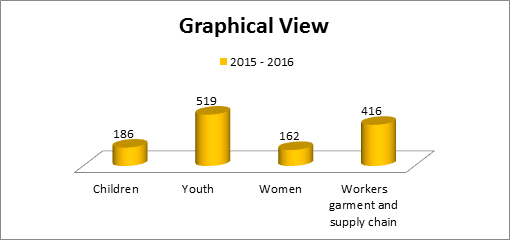Psychosocial Health (PH)
To promote the Psychosocial Health SAVE develops life skills on Self-awareness, Creative and Critical Thinking, Problem solving and decision making, and Coping with stress and emotions to vulnerable children, women and workers of youth and adult in textile and garments.
Psychosocial Health
Psychosocial health includes four important components of well-being. The importance of being mentally, emotionally, socially, and spiritually sound was lost on medicine for a long time. A pill was supposed to solve everything. There's plenty of proof that a healthy mind and a content heart are just as important for the prevention of diseases and their treatment. Therefore, this concept of psychosocial health, a state of mental, emotional, social, and spiritual well-being is a better balanced healthy life.
Basic Traits of Psychosocial Health
Individuals who are deemed to be psychosocially healthy aren't completely devoid of problems. Actually, it's not the quantity or quality of a problem, or lack thereof, which makes someone sound in this respect. It's the way people view themselves and how they deal with stressful situations that sets psychosocially healthy people apart from those who are not. Here are just a few traits are 1.Like themselves 2.Accept their mistakes 3.Take care of themselves 4.Have empathy for others 5.Control their anger, hate, tension, and anxiety 6.Are optimistic and 7.Can work alone and with others equally well
Mental Health
The thinking portion of psychosocial health is known as mental health. The beliefs and values in life, as well as how we relate to others and respond to situations in our life, are a reflection of mental health, which overlaps with the other aspect of health we're going to talk about. When something happens to us that we don't like and respond in a positive manner by accepting our mistake and looking forward to its correction, then that's good. But if we show up late for work yet again, get fired, and then blame anyone but ourselves, then that may be an indicator of less than ideal mental health.
Emotional Health
The feeling part of psychosocial health is called emotional health. This includes things like anger, love, hate, and happiness. Oftentimes, emotional and mental health overlap a great deal in some situations. Going back to our example of getting fired from work because we came in late for the umpteenth time, if we feel a bit down, but still have high hopes for the future, that's a positive thing. But if we lash out in a blinding rage against our boss, sulk when we go home, and avoid everyone thereafter, then that may point to improper emotional health. Furthermore, it's not unexpected even for an emotionally healthy person to experience some sadness after getting fired; that by itself isn't conclusive of poor emotional health. Everyone, even the most optimistic people, have their ups and downs. But an emotionally unhealthy person is one that responds to a situation in a manner that is uncontrollable, out of proportion, and extreme.
Emotional intelligence
Emotional intelligence is an ability to understand and manage our emotions and those of others. It has been broken up into five main parts
Know your emotions: Are you able to quickly recognize your feelings?
Manage your emotions: Can you express those feelings appropriately? Are you able to cope with them well?
Motivate yourself: The more you can do this independently in order to achieve more in your life, the higher your emotional intelligence.
Recognize the emotions of others: The more you can empathize with others, the better
Handle your relationships: The better you are at navigating conflict in life and building a good social network, the higher your emotional intelligence.
Social Health
That relationships is a good way to introduce social health, the ability to create and maintain healthy relationships with others. I'm sure you can already appreciate how much this is related to the concepts we went over in emotional health. Social health goes beyond having appropriate emotional health and intelligence. A person with good social health:
Recognizes the importance of social engagement. We are not supposed to live alone!
A person with good social health is able to support their friends in a time of need and ask for their help when they need it themselves.
They aren't biased, prejudiced, racist, or sexist.
Listens to others well, expresses their feelings just as well, and acts in a responsible manner around others.





